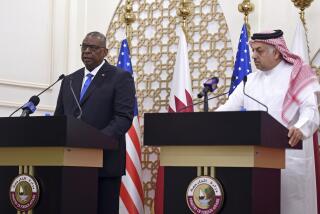Gates increases pressure on Pakistan
Reporting from New Delhi — Stepping up pressure on Pakistan to help thwart further terrorist attacks on India, Defense Secretary Robert M. Gates said Wednesday that the Indian government probably would not show the same level of restraint that it did in 2008 if struck again.
Gates said at a news conference that Al Qaeda and other Islamic militant organizations are hoping to ignite a regional clash between Pakistan and India, a confrontation he said must be averted.
Gates has praised India’s “statesmanship” in the wake of the 2008 Mumbai terrorist attack, which left at least 166 people dead and has been attributed to Lashkar-e-Taiba, a Pakistani-based extremist group aligned with Al Qaeda.
“I think it is not unreasonable to assume Indian patience would be limited were there to be further attacks,” he said.
Some Indian and U.S. officials believe another attack is likely and Gates’ comments seem aimed at increasing pressure on Pakistan to do what it can to prevent it.
At the news conference, Gates was asked whether Indian leaders had pressed him to push Pakistan to take stronger action against Lashkar-e-Taiba and other extremist groups.
He signaled that he intended to try to help reduce Pakistani anxiety over India, to enable the government in Islamabad to keep its eyes on the militant threat.
“Clearly one of the subjects of discussion for my next visit is how to allay their concerns, so they can focus on what has become a real existential threat to Pakistan -- these different terrorist groups operating in its territory,” the Defense secretary said.
Although Gates’ comments pleased the Indian government, Pakistani officials, who dislike public pressure, signaled their displeasure.
A Pakistani Foreign Ministry official said in an Indian television interview that Islamabad remains committed to fighting terrorism and that the United States and India must pass along any intelligence on possible attacks.
“If the U.S. has any information of this kind they must share that information with us in private rather than making any public statements,” Foreign Ministry spokesman Abdul Basit said.
Gates said some militant groups in Pakistan are focused on Afghanistan, some on India and some on Pakistan. But he said that all operated under the direction of Al Qaeda and shared a goal of fomenting regional instability.
“The success of any one of these groups leads to new capabilities and new reputations for all these groups,” Gates said. “A victory for one is a victory for all.”
“It is a very complicated situation; it is dangerous for the region as a whole,” Gates said. “They are a syndicate of terrorist operators, intending to destabilize the whole region.”
During the Defense secretary’s two-day trip to India, senior U.S. officials have praised New Delhi’s cooperation in sharing information on extremist threats. Officials said the intelligence cooperation has been extremely close and productive.
But India has some concerns, particularly about access to David Coleman Headley, who was arrested in Chicago on suspicion of helping plan the attack in Mumbai, formerly Bombay. Indian investigators traveled to the U.S. in November hoping to learn more, but they were denied access to Headley on legal grounds because the case has not yet gone to trial.
Part of the reason for Gates’ trip to New Delhi is to advance a set of agreements designed to expand U.S.-Indian military and technology cooperation.
Harinder Sekhon, a senior fellow with New Delhi’s Observer Research Foundation, said deep concerns remain in India about whether the agreements will allow too much U.S. access to Indian facilities. Both the U.S. and India, she said, had done a poor job of explaining the agreements.
“There is a lot of secrecy about the negotiations,” she said. “If the two governments were more forthcoming, it would dispel a lot of suspicion by the public at large.”
In response to questions from Indian reporters, Gates said the agreements are similar to ones the U.S. has with its Asian and European allies. But he acknowledged that Washington’s explanations had been insufficient.
“We haven’t done an adequate job spelling out the benefits to India,” he said.
The U.S. and India have stepped up military exercises in recent years, and Washington is hoping to persuade India to buy more American weapons systems.
More to Read
Sign up for Essential California
The most important California stories and recommendations in your inbox every morning.
You may occasionally receive promotional content from the Los Angeles Times.










